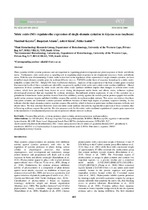| dc.contributor.author | Keyster, Marshall | |
| dc.contributor.author | Adams, Ruqaiyah | |
| dc.contributor.author | Klein, Ashwil | |
| dc.contributor.author | Ludidi, Ndiko | |
| dc.date.accessioned | 2017-06-13T02:00:05Z | |
| dc.date.available | 2017-06-13T02:00:05Z | |
| dc.date.issued | 2013 | |
| dc.identifier.citation | Keyster, M. et al. (2013). Nitric oxide (NO) regulates the expression of single-domain cystatins in glycine max (soybean). Plant Omics Journal, 6(3): 183-192 | en_US |
| dc.identifier.issn | 1836-0661 | |
| dc.identifier.uri | http://hdl.handle.net/10566/2973 | |
| dc.description.abstract | Plant cystatins inhibit cysteine proteases and are important in regulating plant development and plant responses to biotic and abiotic stress. Furthermore, nitric oxide plays a signaling role in regulating plant responses to developmental processes, biotic and abiotic stress. With the aim of determining if nitric oxide is involved in the regulation of the expression of single-domain cystatins, we have identified single-domain cystatin genes in soybean (Glycine max cv. PAN626) on the basis of sequence homology to a nitric oxide-inducible cystatin (AtCYS1, At5g12140) from Arabidopsis thaliana. Analysis of the expression of the four cystatin genes revealed that transcript levels of these cystatins are altered by exogenously applied nitric oxide and a nitric oxide synthase inhibitor. Altered expression of these cystatins by nitric oxide and the nitric oxide synthase inhibitor implies that changes in cellular nitric oxide content, which have previously been shown to occur during development and/or biotic and abiotic stress, influence soybean physiological processes that are regulated by cysteine proteases. Recombinant protein expression of one of the cystatins (as a glutathione-S-transferase fusion protein) showed that it has inhibitory activity against the model cysteine protease papain but not the model serine protease trypsin and that it inhibits caspase-like activity in soybean nodule extracts. This serves as evidence that these four plant cystatins are functional cysteine protease inhibitors because of their high degree of primary sequence identity. It also indicates that the single-domain cystatins regulate caspase-like activity, which is known to participate in plant responses to biotic and abiotic stress. We thus conclude that nitric oxide and nitric oxide synthase-like activity regulate the expression of these cystatins, thus influencing soybean caspase-like activity. We also propose a role for this nitric oxide-mediated regulation of cystatin gene expression in the mediation of developmental processes and responses to abiotic stress in soybean. | en_US |
| dc.language.iso | en | en_US |
| dc.publisher | Southern Cross Publishing | en_US |
| dc.rights.uri | Plant Omics is a peer-reviewed, fully open access journal to span all aspects of plant and animal molecular biology, biotechnology and particularly OMICS-es. | |
| dc.subject | Caspase-like activity | en_US |
| dc.subject | Cysteine protease | en_US |
| dc.subject | Plant cystatin | en_US |
| dc.subject | Protein expression | en_US |
| dc.subject | Soybean nodules | en_US |
| dc.title | Nitric oxide (NO) regulates the expression of single-domain cystatins in glycine max (soybean) | en_US |
| dc.type | Article | en_US |
| dc.privacy.showsubmitter | FALSE | |
| dc.status.ispeerreviewed | TRUE | |
| dc.description.accreditation | Web of Science | |

